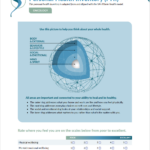“Every year, some 2 million Americans are told they have cancer. … This moment, when people may feel they have stepped over a cliff, is the time to begin engaging the person and those around them in whole person care. From the beginning, the team can acknowledge and begin to address fear and anxiety. The team can let them know that they have work to do between visits—they need to learn about their own role in treatment and recovery beyond worrying.” —Healing and Cancer
A whole-person approach to cancer care means getting to know your patient. Asking “what matters” rather than “what’s the matter.” By using tools such as the Personal Health Inventory (PHI (pdf), you will empower your patient in their journey while also getting to know them better and having a better understanding of who they are and what is important to them.
A recent study published in the Journal of Oncology found that people with cancer have an interest in exploring complementary therapies in addition to conventional medicine, but would like this information to come from their oncologist. They also want this information to come early on in their discussions with their care team, not after side effects arise or survivorship conversations occur.
Here are some additional resources related to diagnosis that will help clinicians to enact whole person cancer care:
- Integrative Oncology Self-Care Guide* (PDF)
- How Healing Works: Healing and Cancer podcast – What does Whole Person Cancer Care look like?
- The Personal Health Inventory for Cancer is a tool to help clinicians have conversations with their patients about the patients’ goals, priorities and interests
-
- Paper version (PDF)
- Electronic version – Smartmeasures PHI
-
- Smartmeasures offers a low-cost (and sometimes free) way to field the PHI tool. (Healing Works Foundation receives no financial incentives or compensation from Smartmeasures)
-
- A free CME course is available to help care teams learn how to provide whole person cancer care.
- PHYSICIANS: This activity has been approved for AMA PRA Category 1 Credits™
- NURSES: Nursing contact hours will be awarded
Personalized Care Across the Cancer Journey
Resources
Latest Blog Post
Group Medical Visits: Can We Address Loneliness and Transform Chronic Disease Care?
If you're a primary care provider whose patients have chronic diseases like diabetes, hypertension, or chronic pain, you know the…






